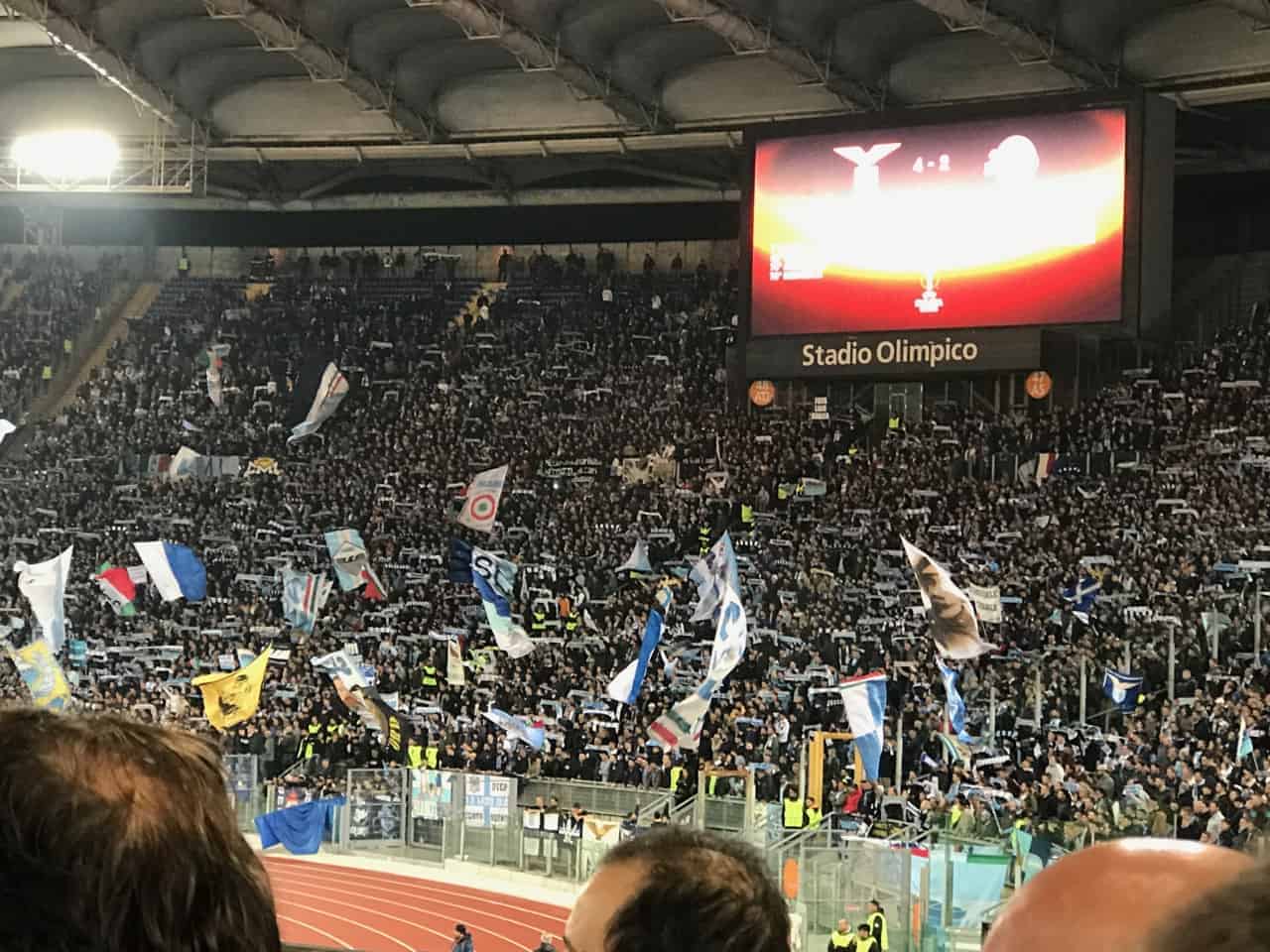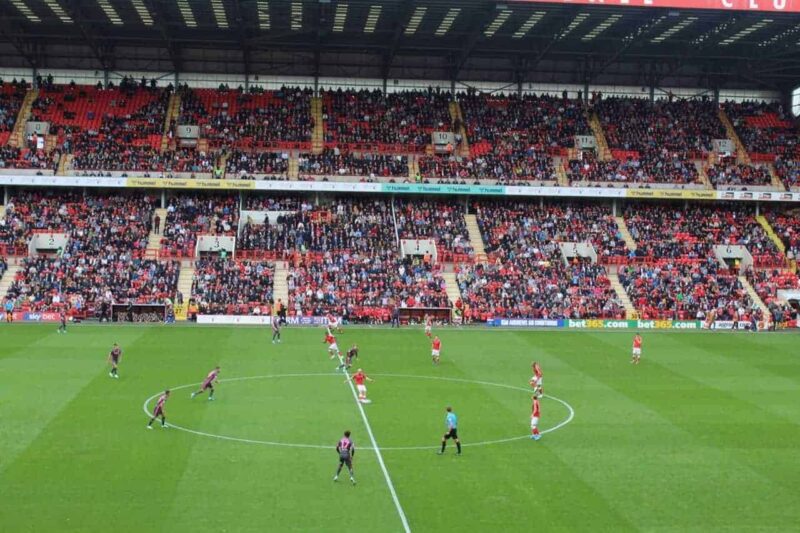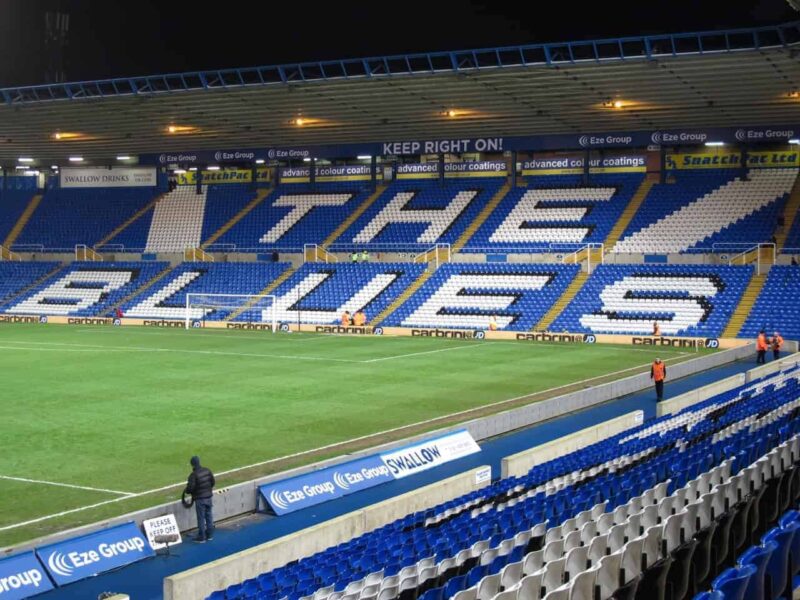One of Groundhopper Guides' employees, Emily, lives in Tuscany and recently took her son to…
Italian Interruption: Seeing a Game at SS Lazio in Rome

Groundhopper Paul happened to be in Rome when Lazio played a home game against Salzburg in the Europa League. This is the story of his first foray into the world of Italian football, or calcio.
It’s a story whose intensity I could not have imagined and, in fact, it’s one I didn’t even see coming.
I arrived in Rome exhausted, sleep-deprived and more than a bit discouraged. The month before had been hard, and energetically I felt as if I had to fight tooth and nail to simply escape from the Indian Subcontinent. But that’s another story.
The night before, I sat in a pizzeria watching Barcelona destroy AS Roma in the Champions League. It was, at the time, among my most Italian moments, sipping aqua frizzante and munching on pizza funghi while tossing out the occasional Bravo at a Roma defender — and it was only the defenders who occasionally earned such praise in a 4-1 loss.
The next afternoon, I awoke from a nap and recalled that on Thursdays after Champions League games, there are Europa League games (Related: What is the Europa League?). And I further recalled that Arsenal were playing that night. I couldn’t remember who they were matched against, so I looked at the fixtures list, and a completely different name leapt out at me: Lazio.
Many Americans might not know this (and I didn’t at the time), but Lazio is a club in Rome. They are the lesser sky-blue outfit to the better-known red and gold of Roma. It’s basically what Manchester looked like about 15 years and seven billion pounds ago: a famous red team playing in Europe, competing for trophies and selling shirts all over the world while a lesser blue team — in this case playing in the same stadium — toiled away in relative obscurity.
Lazio have won the league three times in 117 years, most recently in about 2000. They’ve won the Coppa Italia a few times, but it’s unclear if anyone cares. They average about 25,000 fans in the 70,000-seat Stadio Olimpico, which they share with Roma. And as for shirt sales … well, if you’re coming back from an Italian vacation, would you rather show off your red and gold “Roma” shirt or your sky-blue “Lazio” shirt. The folks back home don’t know who or what Lazio is, right?
But I don’t care; I just wanted to see some football and get my travel groove back. So I got a ticket on the website — 40 euros for a seat somewhere on the east side — and hopped on a bus. But not before I asked the hotel clerk for a good restaurant, whereupon he escorted me to the private kitchen for the suites upstairs, where a very proud chef roasted some lamb chops from a butcher near his country home, sautéed some porcini mushrooms and regaled me with tales of Roma’s many victories over Lazio. For this may be a soccer story, but it does take place in Italy. The lamb was divine, the olive oil “special.”
The bus ride north to the stadium was a welcome release from the tourist trap that is central Rome. How many souvenir shops does one city need, anyway? We rolled through fashionable districts and along the river and through posh residential areas, and then I saw that great universal sight, the streams of people walking towards the glow of floodlights. I hopped off the bus and plunged into the colorful crowd as it wound through what appeared to be a 1940s Mussolini equivalent of the State Fairgrounds in Texas: massive, boring buildings fronted with courtyards, in this case filled with throngs of Italians drinking and smoking and singing.
It was at the outer ring of security that I was reminded, once again, that I was in Italy. I approached a gate, held out my ticket to a large, bearded and unhappy looking man, and he nodded, then looked at me and said, “Documenti?” Baffled, I looked back and repeated what he had said. He looked even more unhappy and said, “Pasaporto?”
A passport? To go to a soccer game? Where the hell am I?
I mumbled something about not having one, and nobody said I needed one. Then we looked at each other for a long moment. Then he shrugged and motioned me in. And in that moment I think I reached Peak Italy. For there is a very complex and agreed-upon system everywhere in this country. And everywhere, it is ignored for convenience.
In the massive stadium, I kept showing my ticket to stewards and being pointed in general directions, all the while hearing an almighty roar coming from the stands. But it wasn’t a roar; it was singing. And not your English or American singing. This was soaring, dramatic, damn near operatic waves of sound, the entire stadium in one overly emotional and very Italian voice. Not wanting to miss a thing, for kickoff was fast approaching, I ducked into the first entryway and got my first glance at the world famous Curva Nord.

La Curva Nord, home of Lazio’s ultras.
Curva simply means “end,” and at Rome’s Olimpico Stadium the two clubs have staked out their territory on each end of the famous old stands. Although they only play each other twice a season, Roma and Lazio nonetheless avoid even the stench of one another by taking their places in the nord and sud ends, generally leaving the other completely empty during home games. So it was on this night: the curva sud empty but for a half section of flag-waving Austrians — this was a Europa League quarterfinal against Salzburg of Austria — while the curva nord was a flag-waving, singing, jumping, swaying and very loud, living sky-blue beast. I’ve never seen anything like it, and somehow it, along with about 25,000 other Italians spread around the stadium, were managing to sing in perfect unison. It was deafening. It was awesome.
As for my seats, well, again, this is Italy. Stewards kept pointing in general directions until they began to ask each other, then they simply gave up and shrugged. I literally had two stewards tell me they didn’t know where my seat was! But by this time I had come to recall the other side of Italian life; it doesn’t matter worth a damn where “my” seat was. For I was standing on a concourse between the wheelchair section and a row of plastics seats mounted to a wall, and it occurred to me that, well, this would be just fine. And right about then the game kicked off to an almighty roar.
Immediately, the differences between Italian football and every other kind I’ve attended began to be apparent. The smoking was one thing. It may or not be legal, but it was ubiquitous.
Also, the pacing. Whenever a Lazio player would miss a pass, or the referee would disturb world peace and order by calling a fallo against the sky blues, all around me men — and it was 98 percent men — would pace around, muttering or shouting, looking to the sky in disbelief, and doing that very stereotypical hand-waving thing that Italians are reputed (accurately) to do.
A few minutes into the game Lazio scored, and within moments I had been grabbed and hugged by two men who before that had never seemed to notice me. Somebody else grabbed my arm with such force that I thought I might lose part of it. Behind me, from those plastic seats mounted to the wall, a wave of young men launched themselves into a pile on the concourse, embracing then jumping and banging into each other. The announcer called out the first name of the goal scorer, letting the crowd scream his last name in response. It was utter madness.
In fact, the goal scorer were named Marco Parolo, which made the ensuing call-and-response really close to magical. Marco! P–olo!”
Everything changed when the referee gave the visitors a penalty which was (a) mighty soft and (b) given nearly 30 seconds after play had continued. He even threw in a yellow card to the “offending” (aka nearest) Lazio player. And it was at this point that the men around me went so far beyond anger and despair that they simply stood like the undead, but with their hands in that classic praying motion, swaying just a little. It was as if they had just seen members of their family fall into the ocean and were frozen in time and space, desperate that they might resurface. I wanted to take photos but was fairly sure I would be torn to pieces.
Salzburg converted the penalty, which was bad enough. Then they had the temerity to celebrate — in front of the Curva Nord no less. And then, in the final blow, after a subdued announcement from the home speaker voice, there was a corresponding one … in German. My god, the vitriol that was unleashed from the Italians! I would like to think such anger would be unleashed at any other language that dared raise its barbaric head in the Stadio Olimpico, but I suspect maybe German, in Italy, gets some special treatment.
The second half was something of a blur, because of the usual ups and downs of calcio, in the overly dramatic Italian style and with the stakes of a European knockout night. Lazio went up 2-1, only for Salzburg to get another — a second away goal, in front of their jubilant fans, and the Italians went back into pacing-muttering-zombie mode.
And then, redemption. Lazio got two in three minutes. The jumping and hugging around me had an almost intentional aspect to it, like it wasn’t mere celebration but rather some agreed-upon ritual which was activated by events on the pitch. There was a subtle but real moment between the goal going in, and then celebration, and … then the jumping and leaping and hugging. It was like, “Yay, we scored … now let’s do this!”
It ended 4-2, with the return leg in Austria next week, and the Italians stuck around to do some serious singing. I would have thought the songs a kind of joke, had I only heard the recorder versions, but I had to remember, again: This is Italy. They invented opera, for chrissakes. And they don’t do restraint, especially after a winning European night.
A few post-game images:
As for me, I needed a couple more reminders I was in Italy. I went outside to a bus stop, to wait for the same bus I had taken there. The schedule said three minutes, and the electronic sign said three minutes … I waited for 40 minutes, during which time about 17 other buses came through. Fantastic. I finally broke down and called for an Uber … at which point the bus showed up … but I went with the Uber anyway. Turns out the driver was a Lazio fan, his voice still hoarse from the game, and he regaled me with tales all the way back, assuring me that in Rome, there is only Lazio.
I don’t know about that. But I don’t care. I got some gelato near my hotel, said some thanks to the Italian soccer gods, and called it a night.


















Post Comments